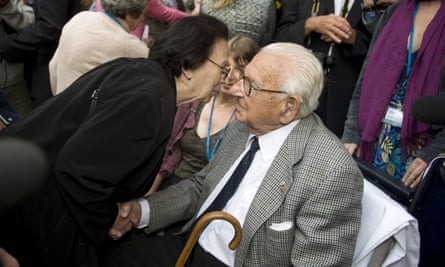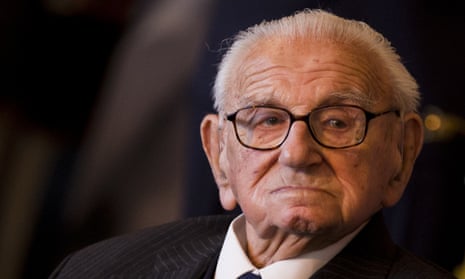Sir Nicholas Winton, who became known as “the British Oskar Schindler” after saving hundreds of Jewish children from Nazi tyranny and slaughter in Czechoslovakia, has died aged 106, his family said.
The unassuming hero, who saved the lives of 669 children in 1939 by sending them from Prague to London by train, died peacefully in his sleep at Wexham Park hospital in Slough, his son-in-law, Stephen Watson, said.

A statement from the Rotary Club of Maidenhead, of which he was a member, reported the death “with much sadness” of a man they acknowleged as “probably the oldest active Rotarian in the world”.
Winton organised eight trains from Prague to London to carry the children from Nazi-occupied Czechoslovakia, when he feared they would be sent to concentration camps, and helped find them foster families in England.
But he told no one of his war time actions for half-a-century – not even his wife and children.
From a German-Jewish family, he received a knighthood in 2003 and a Hero of the Holocaust medal at Downing Street in 2010. Last year he was awarded the Order of the White Lion by the Czech president, Milos Zeman, at a ceremony in Prague.
Explaining his motivation, he told the BBC Radio 4’s Today programme last year that he was well aware of the urgency of the situation in 1939.
“I knew better than most, and certainly better than the politicians, what was going on in Germany. We had, staying with us, people who were refugees from Germany at that time. Some who knew they were in danger of their lives,” he said.
Winton was 29 when he arrived in Prague in 1938 to visit a friend, and through the British committee for Refugees from Czechoslovakia he sensed what was going on, and returned to London to organise the trains.
His greatest regret was that a final train of 250 children was prevented from leaving when Poland was invaded, and all are believed to have died at Auschwitz along with 1.1 million other prisoners, the vast majority of them Jews.
His extraordinary humanitarian effort only became known in 1988 when his wife, Grete, found an old briefcase in the attic with lists of children and letters from their parents. His family took the scrapbook to Esther Rantzen’s That’s Life programme, where he was reunited on screen with one of the women he had saved.
He was finally reunited with hundreds of “Winton children”, and their children. Several films have been made of his life story.
The British prime minister, David Cameron, said: “The world has lost a great man. We must never forget Sir Nicholas Winton’s humanity in saving so many children from the Holocaust.”
Among others paying tribute, the home secretary, Theresa May, his local MP, described him as a “hero of the 20th century”.
“Against all the odds, he almost single-handedly rescued hundreds of children, mostly Jewish, from the Nazis – an enduring example of the difference that good people can make even in the darkest of times.”
“Because of his modesty, this astonishing contribution only came to light many years later.”

Lord Sacks, who was chief rabbi of the United Hebrew Congregations of the Commonwealth from 1991-2013, described his as a “giant of moral courage”.
“He was ‘the British Schindler’, all the more impressive for thinking that there was nothing special about what he did, seeking neither honour nor recognition”.
Born in London, he attended Stowe School and worked at the London Stock Exchange, then served in the RAF during the war before working as a banker and company director.
Michael Zantovsky, the Czech ambassador to London who became close friends with Winton after they met 20 years ago, said he was “a positive man who radiated good”.
“It was incredibly moving to be present at some of the gathering of him with his so-called children and the children of his children. They all owe their existence to him.”
- This article was amended on 2 July 2015 to correct the name of the hospital where Sir Nicholas Winton died. It was further amended on 3 July 2014 to correct details about deaths at Auschwitz; an earlier version referred to the deaths of “1.1 million of Czech Jews at Auschwitz”.

Comments (…)
Sign in or create your Guardian account to join the discussion